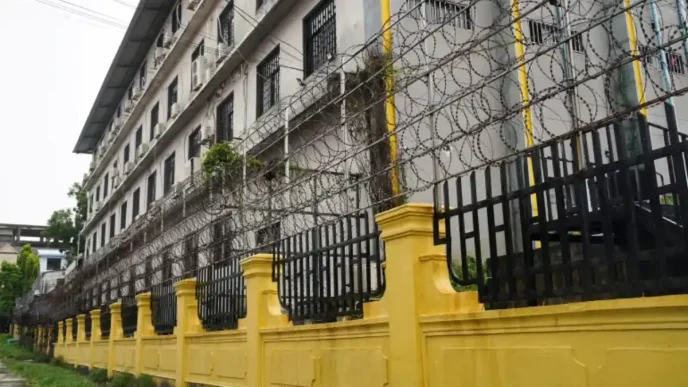In a significant move to tighten tax compliance, the Vietnamese government has introduced a new decree that imposes temporary exit bans on individuals and business representatives with substantial unpaid tax debts. Decree 49/2025/NĐ-CP, which came into effect on 28 February 2025, outlines four specific scenarios where such bans may be applied, targeting both Vietnamese citizens and foreign nationals. The policy, designed to enforce administrative decisions on tax management, has sparked discussions about its implications for personal freedoms, business operations, and Vietnam’s broader economic landscape.
The decree emerges at a time when Vietnam is intensifying efforts to bolster state revenue amid rapid economic growth and increasing foreign investment. While the government frames the policy as a necessary tool to combat tax evasion, critics and business leaders have raised concerns over its potential to deter investment and infringe on individual rights. This article explores the details of the new regulation, its likely impacts, and the context driving Vietnam’s tax enforcement strategy.
A Stringent Approach to Tax Debt
Under the new decree, the Vietnamese tax authorities have the power to prevent individuals from leaving the country if they meet certain criteria related to unpaid tax debts. The first category targets individual business owners or household business owners with tax debts of VNĐ50 million (approximately US$1,950) or more, where the payment deadline has been exceeded by over 120 days. The second applies to legal representatives of businesses, cooperatives, or cooperative unions with debts of VNĐ500 million (about US$19,500) or more under similar conditions.
The third category focuses on individuals or representatives who no longer operate at their registered business address and have overdue tax debts. If they fail to settle their obligations within 30 days of receiving a notice about a potential exit ban, the restriction may be enforced. Finally, the fourth category includes Vietnamese citizens planning to settle abroad, those residing overseas, and foreign nationals who have not cleared their tax debts before departure.
The process for enforcing these bans is heavily reliant on digital infrastructure. Tax authorities are required to notify affected individuals electronically through their tax transaction accounts or, if that fails, via postings on the tax authority’s online portal. If the taxpayer does not comply within 30 days of the initial notice, a formal exit ban is issued and communicated to immigration authorities, who are tasked with enforcing it. Conversely, once debts are settled, the tax authority must notify immigration within 24 hours to lift the ban, ensuring a swift resolution for compliant taxpayers.
Context and Rationale Behind the Policy
Vietnam’s introduction of exit bans for tax debtors must be understood within the broader context of its economic ambitions and fiscal challenges. Over the past decade, the country has positioned itself as a manufacturing hub in Southeast Asia, attracting significant foreign direct investment (FDI) with its competitive labour costs and strategic location. However, this rapid industrialisation has also exposed gaps in tax compliance, with both local businesses and foreign entities occasionally exploiting loopholes to minimise tax liabilities.
The government’s push for stricter enforcement aligns with its broader goal of achieving upper-middle-income status by 2030, a target that requires substantial public investment in infrastructure, education, and healthcare. Tax revenue is a critical component of this strategy, and officials have repeatedly emphasised the need to curb evasion to fund national development. The new decree, therefore, is framed as a deterrent against non-compliance, ensuring that individuals and businesses contribute their fair share to the state coffers.
Beyond fiscal motivations, the policy also reflects Vietnam’s ongoing efforts to modernise its administrative systems. The reliance on electronic notifications and IT integration with immigration authorities signals a shift towards digital governance, a priority for the ruling Communist Party of Vietnam (CPV). This aligns with the country’s National Digital Transformation Programme, which aims to streamline public services and enhance transparency by 2030. However, the effectiveness of this digital approach remains to be seen, particularly in rural areas where access to online platforms may be limited.
Potential Impacts on Businesses and Individuals
While the decree’s intent is clear, its implementation raises several questions about its impact on Vietnam’s business environment and personal freedoms. For small and medium-sized enterprises (SMEs), which form the backbone of the country’s economy, the threshold of VNĐ50 million in unpaid taxes could pose a significant barrier. Many SMEs operate on tight margins and may struggle to meet tax obligations during economic downturns or seasonal fluctuations. An exit ban on business owners in such scenarios could disrupt operations, particularly for those reliant on international travel for trade or investment.
Larger businesses, meanwhile, face a higher debt threshold of VNĐ500 million before an exit ban is considered. However, the inclusion of legal representatives in this category means that executives and managers could be personally affected, even if the debt is tied to the company rather than their individual finances. This has led to concerns among business associations that the policy could discourage foreign executives from taking up roles in Vietnam, where tax disputes are not uncommon due to complex regulations and inconsistent enforcement.
For individuals, particularly those in the fourth category planning to settle abroad or foreign nationals, the decree introduces an additional layer of bureaucracy before departure. While the government has mechanisms in place to lift bans swiftly upon payment, the 30-day notice period and potential delays in communication between tax and immigration authorities could result in missed opportunities, such as job offers or family reunions overseas. If procedural inefficiencies arise, as they often do in Vietnam’s still-developing administrative systems, the policy risks alienating segments of the population and the expatriate community.
Moreover, the use of exit bans as a coercive measure raises ethical questions about balancing state interests with individual rights. While the policy targets tax evasion—a legitimate concern—it also encroaches on freedom of movement, a principle enshrined in international human rights frameworks to which Vietnam is a signatory. Critics argue that alternative measures, such as fines or asset seizures, could achieve similar outcomes without resorting to travel restrictions. If public backlash grows, particularly among the middle class or diaspora communities, the government may face pressure to revisit the decree’s scope.
Broader Economic and Political Implications
From an economic perspective, the decree could have a dual effect. On one hand, it may strengthen state revenue by compelling taxpayers to settle debts promptly, thereby providing more resources for public spending. On the other hand, if perceived as overly punitive, it risks deterring foreign investment at a time when Vietnam is competing with neighbours like Thailand and Indonesia for FDI. Multinational corporations, already navigating a complex regulatory landscape in Vietnam, may view the exit ban as an additional risk factor, particularly for their senior staff.
The policy’s political ramifications are equally significant. Tax enforcement is often a contentious issue in Vietnam, where public trust in government institutions varies widely. While the CPV maintains tight control over political discourse, grumblings about perceived overreach or unfair treatment could fuel discontent, especially if the decree disproportionately affects small business owners or lower-income individuals. The government will need to balance enforcement with public communication to avoid alienating key constituencies.
Furthermore, the decree’s focus on digital notifications and IT systems highlights Vietnam’s broader push for technological advancement. If successful, this could serve as a model for other administrative reforms, demonstrating the potential of e-governance to improve efficiency. However, if technical glitches or accessibility issues undermine implementation, it could reinforce scepticism about the state’s capacity to modernise effectively.
Looking Ahead: Challenges and Opportunities
As Decree 49/2025/NĐ-CP takes root, its long-term success will depend on several factors. First, the government must ensure that tax authorities and immigration officials are equipped to handle the administrative burden of enforcing exit bans, particularly in cases involving foreign nationals or citizens abroad. Clear guidelines and robust IT infrastructure will be essential to prevent procedural errors or delays that could undermine public confidence.
Second, transparency in implementation will be critical. Taxpayers must be adequately informed of their obligations and the consequences of non-compliance, with accessible channels for resolving disputes or seeking clarification. Without such measures, the policy risks being seen as arbitrary or punitive, rather than a fair mechanism for ensuring compliance.
Finally, the government may need to consider exemptions or leniency for certain groups, such as SMEs facing temporary financial hardship or individuals with urgent personal reasons for travel. A one-size-fits-all approach is unlikely to address the diverse circumstances of Vietnam’s population, and flexibility could help mitigate unintended consequences.
In conclusion, Vietnam’s new decree on exit bans for tax debtors represents a bold step towards strengthening tax compliance and state revenue. While its objectives are aligned with the country’s economic goals, the policy’s impact on personal freedoms, business confidence, and public trust remains uncertain. As the government navigates these challenges, it will need to strike a delicate balance between enforcement and empathy, ensuring that the pursuit of fiscal discipline does not come at the expense of broader societal harmony. Only time will tell whether this decree becomes a cornerstone of Vietnam’s fiscal policy or a cautionary tale of overreach.














